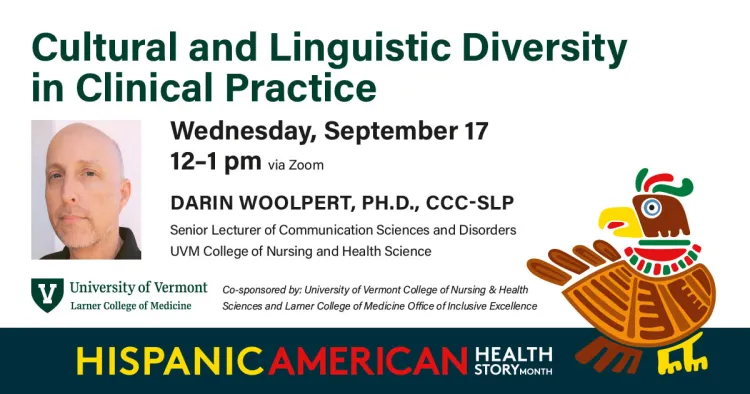Ahead of his upcoming lecture, "Cultural and Linguistic Diversity in Clinical Practice," Woolpert shares insights into his work and the importance of cultural awareness in clinical care.
What drew you to focus on cultural and linguistic diversity in clinical care?
Woolpert: After living in Spain for a couple of years and becoming fluent in Spanish, it felt natural to focus on bilingualism during my doctoral studies. That interest gradually expanded into a broader exploration of cultural and linguistic diversity. I see it as a key component of what are often called “soft skills”—like building rapport. Some studies suggest that the strongest predictor of whether a doctor will be sued is how the patient felt about their personal treatment. That speaks volumes about the importance of interpersonal connection.
How does cultural awareness improve patient outcomes?
Woolpert: Much like in teaching, engagement and connection are essential. You can’t expect honest answers from someone who doesn’t trust you—especially when discussing sensitive topics. In my field, which leans more toward rehabilitation, patients are more likely to attend sessions, stay engaged, and follow through with home practice when they feel a genuine bond with their clinician. Cultural attitudes toward certain treatments also play a role and can influence outcomes.
What challenges do clinicians face when working with diverse populations?
Woolpert: One major challenge—perhaps influenced by my own field—is authentic communication. Rapport is crucial for fostering openness, which is often necessary for accurate assessment and effective treatment. These challenges are amplified when working through an interpreter, as it introduces another layer between clinician and client.
Can you share an example where cultural competence made a difference?
Woolpert: This example comes from teaching rather than clinical work, but the principle applies. Early in my career, I was very focused on maintaining professional distance from students—keeping personal details to myself and upholding a clear boundary. But as I began discussing cultural and linguistic issues more openly in class, I realized how personal these topics can be. I felt it was only fair to be more open myself. As a result, students reported enjoying my courses more, and I received more sincere communication from them. One student, for instance, shared that they had been missing class because they were struggling and living in a camper van.
Also, I’d like to gently challenge the term “cultural competence.” I used to use it frequently, but I’ve come to see it as misleading. It implies that cultural understanding is something you can master and move on from. Instead, I advocate for a mindset of ongoing reflection and growth—what some call cultural humility or cultural awareness.
What’s one key takeaway you hope attendees leave with?
Woolpert: I hope people walk away with a deeper understanding that diversity is universal—it’s not limited to race or ethnicity. It includes sexual orientation, gender identity, ability, religion, social determinants of health, and language. More specifically, I want to challenge the idea that only some people have accents or speak dialects. We all do. When your way of speaking aligns with the mainstream, it’s easy to believe it’s “normal,” and that only others speak differently. That’s a misconception worth unpacking.
Event Details
The 2025 Hispanic American HEALTHstory Month Lecture, "Cultural and Linguistic Diversity in Clinical Practice," takes place on Wednesday, September 17, 2025, from 12:00–1:00 PM online.

About the Speaker
Darin Woolpert is a senior lecturer in communication sciences and disorders at UVM and director of the Speech-Language Pathology Assistant program. His teaching focuses on language development, language disorders, and cultural and linguistic diversity. His research explores spoken language predictors of literacy development in bilingual (Spanish-English) children, with attention to cross-linguistic activation, narrative development, and written expression. Drawing from clinical experience in bilingual elementary school settings and a passion for international education, Woolpert examines how language, culture, and evidence-based practice intersect in his work.
Co-sponsored by the UVM College of Nursing and Health Sciences and the Larner College of Medicine Office of Inclusive Excellence, the lecture is part of HEALTHstory Month, which highlights the historical and social factors shaping public health across U.S. populations.
